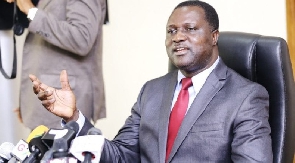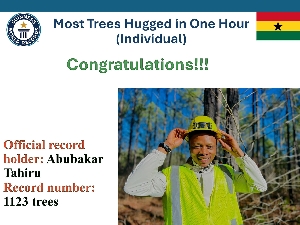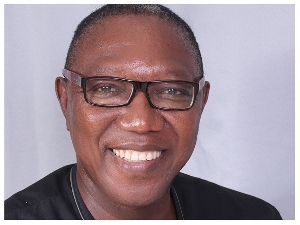Today in History: ‘US doesn't cane children but been to the moon, we've caned ours for 60 years yet achieved nothing' - Adutwum
 Former Deputy Minister of Education, Hon. Dr Yaw Osei Adutwum
Former Deputy Minister of Education, Hon. Dr Yaw Osei Adutwum
In 2020, the then deputy Education Minister, Dr. Yaw Adutwum, bemoaned the rationale behind the canes used on Ghanaian students by teachers.
According to the current Minister-designate for Education, countries like the United States of America where school children are not beaten have been to the moon but 60 years of constant caning of students in Ghana has brought nothing.
“I lived in a country [US] that did not cane children, yet they have been to the moon and back; we have been caning our children for 60 years but where have we gotten to?” Dr. Adutwum asked.
Read the full story originally published on March,2 2020, on Ghanaweb
A deputy Education Minister, Dr Yaw Adutwum, has said countries, where schoolchildren are not beaten, have been to the moon but in Ghana where children have endured corporal punishment for over 60 years, has not gotten anywhere near those countries.
“I lived in a country [US] that did not cane children, yet they have been to the moon and back; we have been caning our children for 60 years but where have we gotten to?”, Dr Adutwum asked.
He said there is enough literature and science to prove that: “If children are afraid, they can’t learn. Children acquire language easily when there is zero anxiety.”
He expressed surprise that teachers who have been trained in child psychology are also pushing for caning of children.
Dr Adutwum has also challenged Ghanaians to be globally competitive rather than seek to be champions of mediocrity.
Instead of touting Ghana’s educational system and products as being better than Senegal, The Gambia, Sierra Leone, Dr Adutwum said Ghana should “break from the African mediocrity trap” and start competing with the likes of Singapore, Finland and the USA.
He said Ghana can only achieve that through education, and, more importantly, through a deliberate curriculum that addresses issues of access, quality and relevance, at the same time.
He was speaking at the National Stakeholder Engagement on the Common Core Programme (CCP), the curriculum to be implemented from Basic 7 to Basic 10 (JHS1-SHS1).
Well-Rounded Curriculum
According to the Deputy Minister, the country has, over the years, adopted the piecemeal approach in its educational reforms and has, therefore, not been able to achieve the optimum results.
He cited instances such as the increase and reduction of the number of years at the SHS level, building of schools to address issues of access, the changing of parts of the curriculum at different times, all in an effort to bring the best out of the students.
“You cannot implement one thing in the educational system and expect things to change; you have to do different things at the same time before optimum results will be achieved,” he stated.
While admitting that quite a number of things are implemented in the last three years which appear a bit “dizzying”, he was quick to add that it is only when you have all the different policy measures and institutions working at the same time that the desired results will be achieved.
“This reform is the first holistic, well-rounded educational reform in the history of our country,” he said, adding, if the curriculum is changed but the structure of teaching or the capacity of teachers is held constant, nothing will be achieved.
It is for this reason that the National Teaching Council (NTC) and National Inspectorate Board (NIB) are involved in the implementation of this new curriculum, with teachers now having to be trained for four years.
In addition, there is now the Professional Development Days in the calendar for teachers to develop their competencies as well as professional learning communities set up by GES for the teachers to take advantage of.
“Whatever NaCCA is doing, if we don’t create the right ecosystem, it will not be effective,” he stated.
Nomadic knowledge workers
The Deputy Education Minister said the object of the CCP curriculum is to ensure that the children acquire the soft skills of the 21st Century in order for them to be globally competitive.
He cited instances where persons he referred to as ‘nomadic knowledge workers’, were brought into the country to fix one problem or another, especially in the oil sector for a week, and were paid salaries better than he received for a year.
“These are individuals who are so versatile with unique skills, including teamwork and who can solve problems across the world,” he said, adding, this curriculum is expected to create such nomadic knowledge workers among Ghanaians.
Dr Adutwum said: “If we do not ensure our children have the requisite skills to be globally competitive, we are in trouble because menial jobs, such as cleaning, washing, packing etc., which some of our graduates have been doing, have been lost to robots”.
The Executive Secretary of NaCCA, the outfit championing the Curriculum reform and the stakeholder engagement, said the country must know where it wants its children to be in 20 years.
“What kind of citizens do we want in 20 years? Do we want graduates who will finish and set up unemployment associations or those who would have the entrepreneurial skills to set up their own jobs?
A shift from knowing to doing
Dr Prince Armah said the CCP emphasises “what people can do and not what people know.”
He said there are nine common core subjects including Mathematics, English, Religious and Moral studies; Physical and Health Education, which will be made compulsory from Basic 7 to 10.
In-built in the curriculum are the 21st Century soft skills such as leadership, ability to communicate, good analytic skills and problem-solving, Dr Armah noted. These are in addition to moral values, religious tolerance, counselling and guidance, which are all embedded in the curriculum.
- Today in History; 'Be truthful on real cause of recent power outages' – ICU urges government
- FLASHBACK: Forget cocoa and oil, 'wee' can be our highest foreign exchange earner – Ras Mubarak
- FLASHBACK: 5 steps to owning your first house in Ghana
- Today in History: 'Dumsor is collapsing our business' – Cold Store owners cry to government
- Today in History: Using internet in Ghana is expensive - World Bank
- Read all related articles












